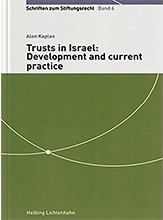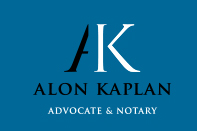Getting the Deal Trough
Alon Kaplan, Lyat Eyal and Meytal Liberman
- Published in מאמרים
נאמנויות וירושות בישראל (אנגלית)

Dr Alon Kaplan,TEP
Introduction
- Israel has been ‘home’ for many international families with a connection to the country both from an emotional “sense of belonging” as well as from a financial perspective “the start-up Nation” and involvement of international large companies such as Intel, Google Apple and Facebook.
These sentiments make and maintain Israel a preferable investment jurisdiction, mainly in the banking, private equity High tech technology and real estate areas.
- Non-residents have enjoyed various advantages for holding assets in Israel over the years, mainly in the tax arena, some of which, but not all, remain valid today. Substantial foreign funds have been invested in the Israeli markets.
- Worldwide financial markets and centers have evolved following legislation such as FATCA and CRS. Israel, as a member of the OECD has not remained behind. Nonetheless, in a democracy with a modern and developed independent legal system based on Anglo principles, a globally oriented economy and high-tech industry, a highly professional judicial system, internationally renowned and experienced professionals, it still remains an investment hub.
- International families in the modern era of globalization and movement of people and assets require adequate planning for the holding of assets, investments, cross generational transfer of assets, cross generational business managements transfers and similar areas.
Israel’s relevant legislation, including without limitation, the Agency Law 1965, the Gift Law 1968, the Inheritance Law 1965 (the “Inheritance Law”), the Trust Law 1979 (the “Trust Law”), the Tax Ordinance [New Version], Contract Law 1973 (“Contract Law”) may govern activities and planning by non- residents in Israel.
While criticized in a number of jurisdictions (usually for the wrong reasons), trusts remain a legitimate planning option for various international families and cross border issues in Israel. Israel’s Trust Law governs the establishment of a trust similar to the English trusts, increasingly popular among non-residents.
- The trust institution has been recognized within the territory as early as the1920s, when Jewish families residing in the territory held real property in trust structures under the Muslim Waqf, prior to the foundation of the State of Israel in 1948.
During the British Mandate, 1922-1948, the first trust law was legislated relating to public charities and was based on the common law trust. During these years, private trusts were utilized by Zionist organizations and Jewish families from Europe, United States and Canada as these were jurisdictions in which individuals were familiar with the trust regime. Most professionals in Israel during these years were educated in England and were familiar with English common law principles.
- Following the establishment of the State in 1948, precedents were established in the field of trusts and in 1979 the Trust Law was legislated, and is valid to date. Court precedents have been established over the years in the areas of inheritance, gifts and trusts.
When finally enacted, the Trust Law featured several innovations. Three of these created interesting practical possibilities: the Trust Law allowed the creation of trusts without the settlor transferring full legal title of the trust assets to the trustee; it set no limit whatsoever to the duration of trusts; it permitted non-charitable purpose trusts;
Many Israeli practitioners chose to create for their Israeli and non-resident clients trusts under foreign trust regimes and such trusts are recognized in Israel.
- 7. As a general rule, trusts governed by the Trust Law may be settled by contract or by deed. Trusts settled by contract are governed by the agreement which does not require a written agreement (although proving the terms of the trust may be difficult where there is no written agreement). Contractual trusts do not permit generational transfer of assets upon the settlor’s demise as they do not satisfy the Inheritance Law requirements for the transfer of assets upon death and probate/inheritance proceedings are required for the transfer of the assets to the settlor’s heirs.
Trusts created by deed (known as ‘Hekdesh’ under the Trust Law) require a written Trust Deed signed before an Israeli notary. The trust is established upon the trustee obtaining control of the trust assets. The Trust, upon settlement and management in accordance with the legal requirements, removes the assets from the settlor’s estate therefore not requiring probate or inheritance proceedings upon the settlor’s demise.
Testamentary trusts may be settled within an individual’s last will and testament. Such trusts must be in writing, executed in accordance with the legal formalities required by the Inheritance Law and is valid upon the issuance of a probate court order by an Israeli court.
Conclusion
This introduction to the Trust Law in Israel may lead readers to look for more information about Trusts in Israel.
The book “Trusts in Israel: Development and current practice” was the subject of my dissertation for the PhD at Zurich University. It was published in a limited edition in 2015 by Helbing Lichtenhahn Verlag ,Basel.
A revised new edition under the title “Israel Trust and Estate Law” will be published in New York by Juris Publishing in the fall of 2016.
- Published in בלוג
Alon Kaplan and Lyat Eyal
This article treats the Israeli Hekdesh coupled with an Israeli underlying company as a foundation. It summarizes the taxation of foundations and trusts in Israel, as well as the main provisions of the relevant legislation as revised in 2013 which is now final and effective. The article then continues to discuss the appointment of protectors under Israeli law. Finally, the article provides for an interpretation of the arbitration law as it relates to foundations and trusts.
- Published in מאמרים
- Published in ביקורות ספרים
אלון קפלן
- Published in ביקורות ספרים
Hekdesh – The Israeli Foundation
Alon Kaplan and Alan Krost
The article illustrates that the Hekdesh, which is a special type of trust existing under Israeli law, is in fact similar to a foundation. The article discusses the law relating to the Hekdesh and highlights the features of the Hekdesh focusing on the similarities to a foundation and emphasizing its advantages over a foundation.
- Published in מאמרים
A concise and high – level read
- Published in ביקורות ספרים




